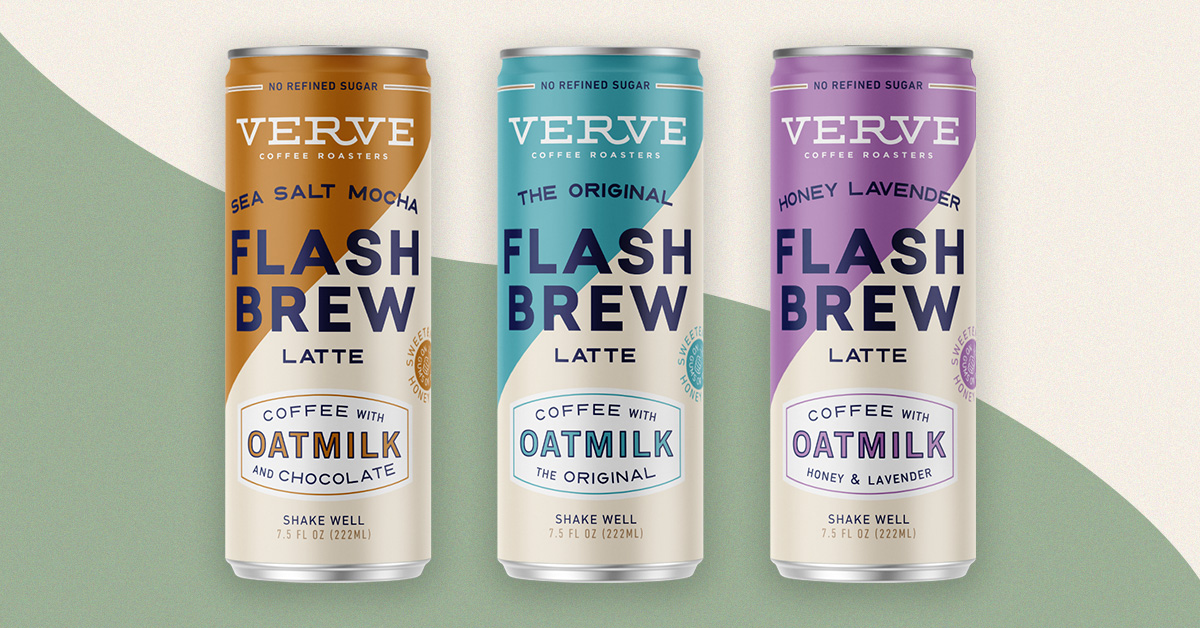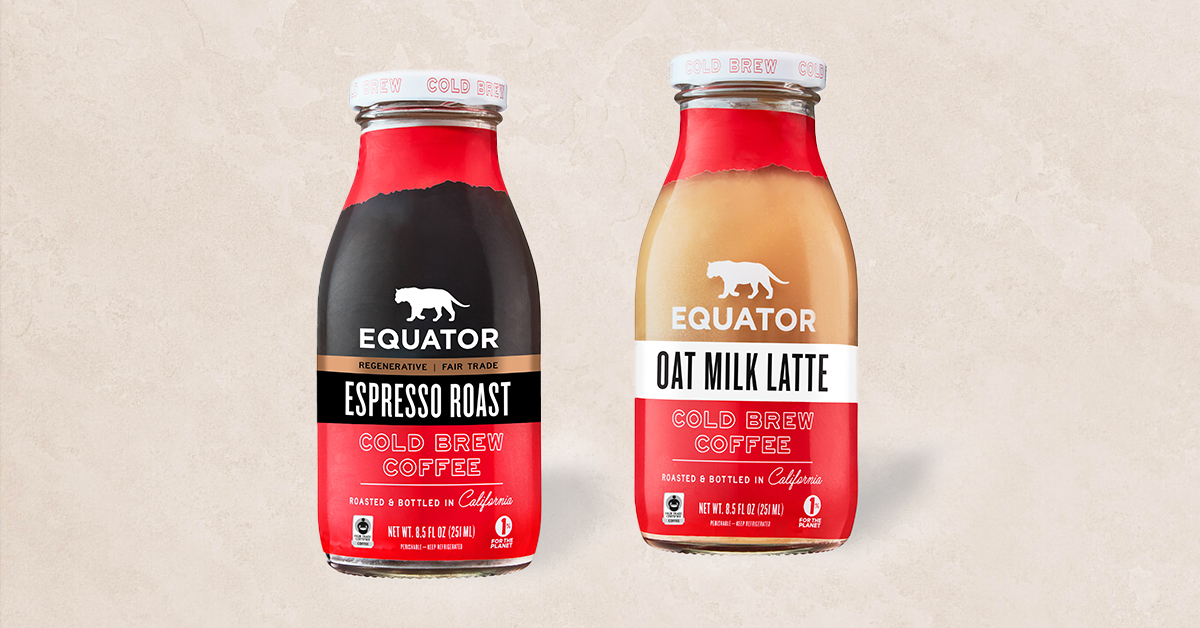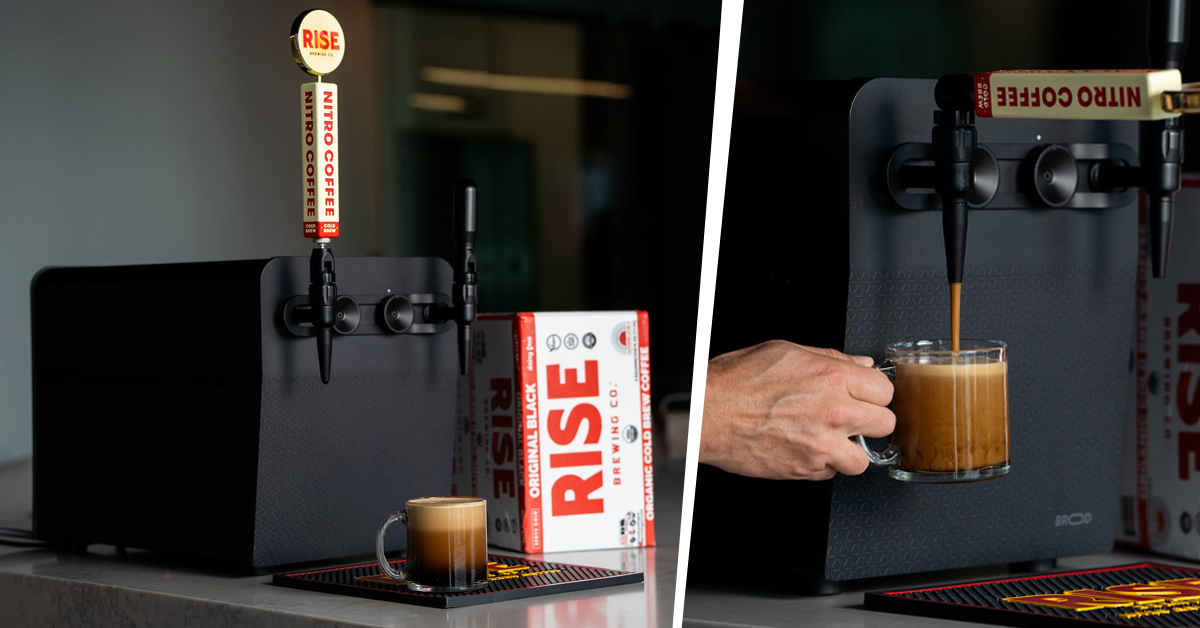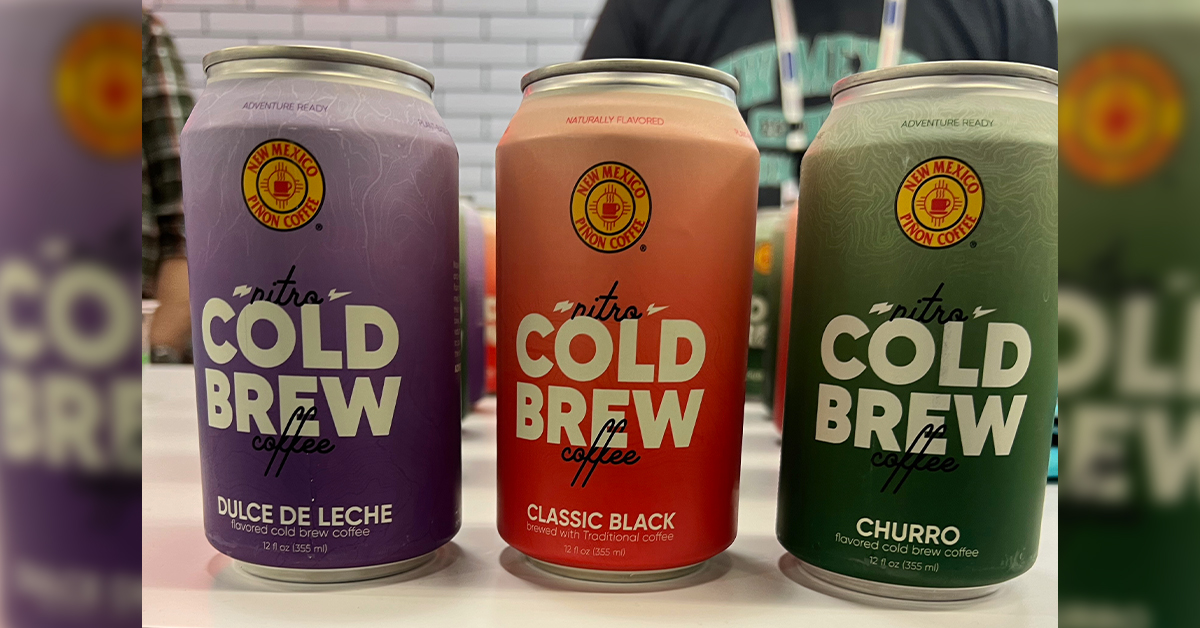Our latest Expo West recap takes a look at innovations and updates in the RTD coffee category, including revamped and reformulated oat milk lattes from Verve, Equator’s latest line expansion, a new brew from New Mexico and RISE Brewing’s keg-free collab with coffee dispenser BROOD.
Still Hot on Cold Coffee, Verve Revamps Oat Milk Lattes
It’s strange to imagine, but at one point Starbucks was considered to be at the bleeding edge of specialty coffee in the U.S., a position that it successfully leveraged to become the top-selling ready-to-drink brand in the category by some distance.
In the decades since, the next wave(s) of specialty coffee roasters advanced education and innovation to new heights and, driven by young consumers specifically, helped make cold coffee the sales behemoth it is today. For a generation of kids trained to fork over at least $5 for a cold brew on-tap, shouldn’t a high-quality, barista-crafted RTD that accurately captures the cafe experience represent great value, even with a premium price?
That thesis was quietly being tested at Expo West earlier this month, starting with Verve Coffee Roasters. The Santa Cruz-based company has climbed to the heights of the industry — culminating in winning “2024 Roaster of the Year (Macro)” from industry bible Roast Magazine — without the benefit of a massive RTD business, a position that lends credibility to enter a familiar category but also leeway to try a different approach, i.e. opting for “Flash Brew,” a hot-brew process which retains the complexities and aromas of the bean, over the more common cold brew for its oat milk lattes.
Verve Flash Brew debuted with dairy-free, single-origin versions in 2019, but it’s the oatmilk lattes, introduced last summer, that received a handful of subtle but impactful upgrades at this year’s show. First, the three-SKU line is now shelf-stable, a request the brand heard from many of its wholesale accounts, explained Verve’s head of RTD, Baker Carroll. After one of its major oat milk ingredient partners closed, the company also shifted gears and reformulated to use “natural binders” rather than gums or oils. Elsewhere, sugar has been dropped completely as an ingredient, with honey used as a natural sweetener.
The cans have also been gently tweaked: a callout for “No Refined Sugars” has replaced “Flash Brewed for Freshness” at the top rim of the can, and a new badge on the side calls out “Sweetened with Honey” and “No Gums or Oils.”
There’s a new flavor, too: Sea Salt Mocha, which replaces the previous Chocolate. All 7.5 oz cans retail for around $4.19 each.
The full roster is going into “most key partners,” including Whole Foods, Sprouts, Gap HQ and as a to-go option in Verve’s own cafes (its coffees are also served at CapitalOne Cafe locations).
Equator Expands With Revamped Design
Equator Coffees arrived at Expo West a little less than a year into its partnership with Swiss dairy giant Emmi to produce a line of premium refrigerated RTD cold brews. But that’s just a small chapter in the Marin, California-based brand’s 30-year story, a journey that is being celebrated across its product lines this year.
First off: a revamped look and labeling system for Equator’s bagged coffees. Speaking with BevNET prior to the show, head of marketing Shelby Colley explained that the brand’s approach has become “more polished” in recent years, with seasonal releases offering a chance to expand beyond its signature black and red color scheme. That helped inspire a rethink for “what Equator will look like for the next 30 years”; the result is a front-of-pack ‘ledger’ packed with details on farming methods, flavor profile and processing, with color used to differentiate between blends, single origins, espressos, decafs, and selections from the Chef’s Collection.
As for the 8.5 oz. RTDs, the clear glass bottles still look the same, but Equator is introducing two new flavors developed in line with consumer feedback from the line’s initial run: Oat Milk Latte, its first plant-based dairy SKU, and Espresso Roast, which offers a “bolder” experience than the existing Pure Black cold brew. That product – which will feature a rotating single-origin bean, the first of which comes from Peru – notably, also represents one of the first regenerative organic RTD coffees on the market (Groundwork Coffee also had one on display at Expo).
The updates tease the still barely-tapped potential of the Equator-Emmi relationship, with each company’s deep experience in their respective sectors coming to the fore: TK noted that Emmi’s success with its Cafe Latte RTDs in Europe is “fueling what we want to do.” Yet growth will still be measured and purposeful: there are no plans to move into shelf-stable, and the drinks will continue to be seeded in stores in Texas (Central Market) and California, where Espresso Roast and Vanilla flavors are set to enter Sprouts stores soon.
The changes represent Equator’s larger ambitions to stretch across products and formats, as reflected in its willingness to collaborate with brands like TCHO Chocolate and Cometeer.
“Part of what we are trying to accomplish is to create multiple touchpoints for the brand within grocery stores,” said Brett Lanford, Equator’s managing director of RTD. “Having that touch point where consumers see the Equator tiger and understand the business gives us an advantage to other competitive products that don’t have the abilities and relationships that we have.”
RISE Takes Innovation Outside of Can
Long before it made the move into cans and cartons, organic cold brew specialists RISE made its bones as a keg supplier to office and cafe accounts in and around New York City. Its latest innovation takes the company back to its roots, as it works with Canadian coffee tech company BROOD to offer on-premise accounts a new dispensing solution.
Prominently featured at the company’s Expo West booth, BROOD’s DRNX system can be integrated with RISE’s shelf-stable BIB format (9 month shelf life), available in 3 gallon (ready-to-drink) or 1 gallon (seven-to-one concentrate) containers that are placed underneath the machine. Liquid travels through a 55-foot brass coil with nitrogen infusion happening in the line, with no additional refrigeration or equipment needed.
BROOD’s U.S. distribution for DRNX systems is now available through Fetco.
Southwest Speciality Looks To New Frontiers
Within the RTD market, regional American coffee styles have been sorely lacking, with a small exception for the handful of New Orleans-style brews on shelves. Thankfully, one brand from New Mexico is looking to spice up the category, literally.
The name says it all: launched in 1994, New Mexico Piñon Coffee makes coffee roasted with pinon, a pine nut native to the deserts of the American southwest that adds a subtle nutty and chocolatey flavor. Now one of the state’s largest roasting operations, NMPC sells its range in bags and single-serve pods across the region and online, but the brand’s 12 oz. cold brews are the focus of its ambitions to reach into new markets nationwide.
The shelf-stable, nitro infused cans are produced from a 20-hour extraction process that’s all done in-house, brand reps told BevNET at its Expo West booth. The cold brew has been available in a single SKU (Classic Black) locally for some time, with expansion plans centered around the introduction of two new flavors – Churro and Dulce De Leche – and a move into the surrounding states of Colorado, Texas and Arizona, where single 12 oz. cans will go for between $3.50 and $4.
At around 300mg caffeine, this line looks “adventure ready,” as a front-of-pack callout suggests.




